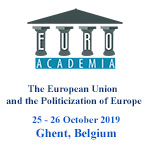Euroacademia Conferences
 Europe Inside-Out: Europe and Europeanness Exposed to Plural Observers (9th Edition) April 24 - 25, 2020
Europe Inside-Out: Europe and Europeanness Exposed to Plural Observers (9th Edition) April 24 - 25, 2020 Identities and Identifications: Politicized Uses of Collective Identities (9th Edition) June 12 - 13, 2020
Identities and Identifications: Politicized Uses of Collective Identities (9th Edition) June 12 - 13, 2020 8th Forum of Critical Studies: Asking Big Questions Again January 24 - 25, 2020
8th Forum of Critical Studies: Asking Big Questions Again January 24 - 25, 2020 Re-Inventing Eastern Europe (7th Edition) December 13 - 14, 2019
Re-Inventing Eastern Europe (7th Edition) December 13 - 14, 2019 The European Union and the Politicization of Europe (8th Edition) October 25 - 26, 2019
The European Union and the Politicization of Europe (8th Edition) October 25 - 26, 2019 Identities and Identifications: Politicized Uses of Collective Identities (8th Edition) June 28 - 29, 2019
Identities and Identifications: Politicized Uses of Collective Identities (8th Edition) June 28 - 29, 2019 The European Union and the Politicization of Europe (7th Edition) January 25 - 26, 2019
The European Union and the Politicization of Europe (7th Edition) January 25 - 26, 2019 7th Forum of Critical Studies: Asking Big Questions Again November 23 - 24, 2018
7th Forum of Critical Studies: Asking Big Questions Again November 23 - 24, 2018 Europe Inside-Out: Europe and Europeanness Exposed to Plural Observers (8th Edition) September 28 - 30, 2018
Europe Inside-Out: Europe and Europeanness Exposed to Plural Observers (8th Edition) September 28 - 30, 2018 Identities and Identifications: Politicized Uses of Collective Identities (7th Edition) June 14 - 15, 2018
Identities and Identifications: Politicized Uses of Collective Identities (7th Edition) June 14 - 15, 2018
Aufstehen, Hinsetzen: Why the European Left Needs to Rethink its Pragmatism
-
-

-
Presentation speakers
- Adrian Kreutz, University of Amsterdam, The Netherlands
Abstract:
In her phase of activism, Rosa Luxemburg famously criticized Karl Kautsky and the ruling circles within the SPD for their inactivity towards, and failure to stand up against Germany’s fling with imperialism for the fear of losing elections. The contemporary European left (in particular German Die Linke movement ‘Aufstehen’ (Standing Up) and French ‘La France Insoumise’ (France Unbowed)) challenges open borders and takes right-wing perspectives on issues of migration in order to “re-”gain support from a working-class which has become susceptible to the nouvelle vague of far-right anti-immigrant rhetoric. The reason is pragmatism. On the 4th of September 2019, Aufstehen movement, founded by a handful of Die Linke-turncoats, celebrates its first anniversary. One year after its “drop”, it is time to see if ‘dirty hands’ pay off. The first section of this paper analyses, what I call, the nationalist-argument against migration, put forward by an unsurprisingly astute European right which not only rekindles the old ‘we-they-antagonism’ between migrant workers and domestic workers, but is now also talking about class struggle; pointing to the recent fiascos of globalization, blaming the ruling elites and the ways they profit from open borders. In the second part of the paper, I expose the structural similarities between pragmatic anti-immigration arguments put forward by Aufstehen and the right nationalist-argument: There is no difference in content, only in jargon.
-
Related Presentations

The Sin of Indifference: Europe and the Ancient Greece
- Firat M. Haciahmetoglu













